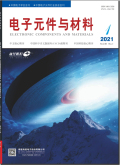电子元件与材料2024,Vol.43Issue(5):565-572,8.DOI:10.14106/j.cnki.1001-2028.2024.0073
Cl,Br,I掺杂改进单晶SnSe热电性能的研究
Thermoelectric property improvement of single crystal SnSe doped with Cl,Br,I
摘要
Abstract
In order to improve the thermoelectric properties of single-crystal SnSe,the density of states,Mulliken population,averaged sound velocity and Debye temperature of the model before and after doping with Cl,Br and I elements were calculated based on the first principle and molecular dynamics simulation to analyze the changes in the thermoelectric properties of the material.The results show that compared with that of the intrinsic SnSe,the peak density of states is increased,the intermolecular forces are weakened,and the phonon velocity and Debye temperature are reduced by Cl,Br and I doping,and then the thermoelectric properties of the material are improved.The electrical properties of selenium stannate is significantly enhanced by I doping,while the thermal conductivity is reduced and the thermal properties of the material is improved by Br doping.Based on this,the optimal working temperature interval for the three doping elements to enhance the thermoelectric properties of the materials is further investigated.The results show that the doping of Cl,Br and I is more effective in enhancing the electrical properties of the materials at 400-500 K.The thermal properties of SnSe are significantly improved at 600 K by Cl-and I-doping,and the thermal conductivity of SnSe at 300 K is significantly reduced by Br-doping.Overall,Cl,Br and I doping at 400 K is more effective in improving the thermoelectric properties of single crystal SnSe.关键词
热电性能/第一性原理/最优温度区间/态密度峰值/声子速度Key words
thermoelectric properties/first-principles/optimal temperature range/peak state density/sound velocity分类
通用工业技术引用本文复制引用
魏诗蒙,王成江,袁小红,徐晓锐..Cl,Br,I掺杂改进单晶SnSe热电性能的研究[J].电子元件与材料,2024,43(5):565-572,8.基金项目
国家自然科学基金重点项目(51577105) (51577105)

